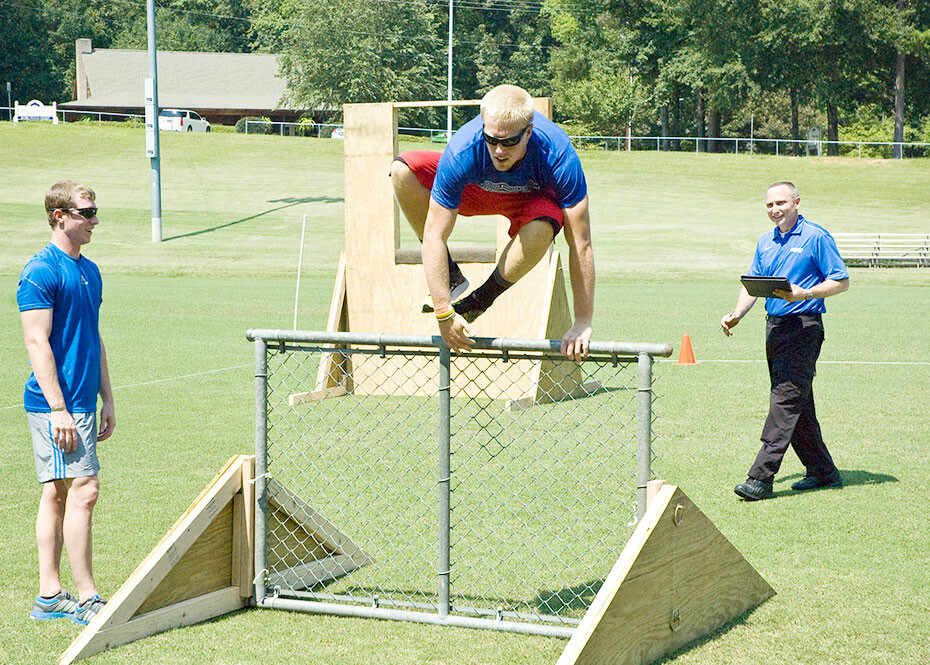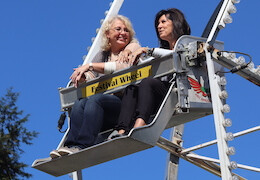Criminal Justice Course takes fitness to a new level

SWU Criminal Justice Professor James McDonald, right, observes as a student goes through fitness testing at Childs Soccer Field. According to McDonald, the course replicates one used by the South Carolina Criminal Justice Academy to assess men and women for a career in law enforcement.
Students learn physical, emotional and spiritual preparedness
On a hot, humid August afternoon at Childs Soccer Field on Southern Wesleyan University’s Central campus, students are already breaking into a sweat before taking the first step on a training course, where they will run, jump, climb, crawl and move a heavy object as they navigate several obstacles.
The course, “Health and Fitness for Criminal Justice,” is part of a new class in Southern Wesleyan’s Criminal Justice Studies program and is designed to help prepare students for the physical challenges they will encounter on the streets.
The class was developed by James McDonald, an 18-year veteran of the criminal justice system and head of Criminal Justice Studies at Southern Wesleyan.
Before the first student enters the course, McDonald shares scripture from the book of Hebrews:
“Therefore, since we are surrounded by such a great cloud of witnesses, let us throw off everything that hinders and the sin that so easily entangles. And let us run with perseverance the race marked out for us, fixing our eyes on Jesus, the pioneer and perfecter of faith.”
The state’s Criminal Justice Academy requires that individuals complete the PAT (Physical Abilities Test), running through an obstacle-filled course, in two minutes and six seconds. PAT was established 20 years ago in response to a call for training that treats officer candidates equally, regardless of gender.
McDonald’s goal is that Southern Wesleyan’s Criminal Justice majors become aware of physical fitness expectations held by the academy and work to improve their time on the course. This goal also reinforces the importance of maintaining a level of physical conditioning.
Kira Emmett, a sophomore from Marion, Ind., finished the course in one minute 47 seconds. She enrolled in Southern Wesleyan’s Criminal Justice program feeling it could open doors for her.
“I am hoping that it will prepare me for my future and what I want to do in my life and the calling God has on me,” Emmett said.
McDonald’s students are evenly split between male and female. Some of them are student-athletes, but not all. He is quick to add that there is more to fitness than how quickly someone can leap over a fence.
“Students aren’t aware of the physical demands of criminal justice and they are totally clueless about the emotional demands,” McDonald said, adding that the class is built on three fitness components – physical, emotional and spiritual.
“I don’t want to just teach them about criminal justice, I want to teach them about why criminal justice is so important and how it’s going to impact their lives,” he said. “I’m convinced that we need Godly men and women in criminal justice.”
The spiritual dimension, according to McDonald, is a key skill needed by law enforcement officers to emotionally survive when they encounter society’s darker side.
He said, “You are called to run into all the bad people doing all the bad things. How do you purge yourself of that? You can take a shower and get the dirt off you, but how do you wash your heart?”
Students must find an Old Testament and New Testament verse to protect them from the spiritual darkness they encounter – scriptures they can claim when they confront difficult situations.
McDonald stresses that Criminal Justice is about much more than becoming a policeman, which challenges conventional perceptions held by many prospective students and the general public. He points to hundreds of jobs available in law enforcement agencies, corrections agencies and the judicial branch.
“We talk about so many career options – police officers, probation officers, working in halfway houses, working with juveniles, working with women – there are so many subsets,” he said.
Details about the Criminal Justice Studies program can be found in the academics section of swu.edu.



